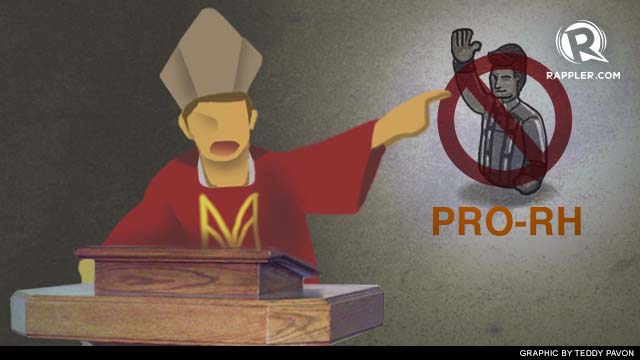SUMMARY
This is AI generated summarization, which may have errors. For context, always refer to the full article.

MANILA, Philippines – From Bacolod to Tuguegarao.
The controversial ‘Team Patay’ campaign initiated by the Diocese of Bacolod has encouraged yet another diocese to do the same. Tuguegarao Archbishop Sergio Utleg has told his parishioners that campaigning against pro-RH law politicians is a Catholic duty.
In a pastoral letter dated April 21, Utleg echoed calls to “reject” and “campaign aggressively” against candidates who “have taken positions contrary to the fundamental teachings of the Church, like those who support the Reproductive Health (RH) law.”
Smarting from its defeat in Congress with the approval of the RH law in December 2012, the Catholic Church has allowed its bishops and priests to call on the faithful to junk pro-RH lawmakers in the coming May elections. The law compels government to finance and facilitate access to contraceptives.
The Church’s aggressive election stand however has divided its flock.
Lingayen-Dagupan Archbishop Socrates Villegas has rebuked his fellow bishops against overt political acts in the May elections, saying it is a game that the Church will end up losing in the end. “When the Church endorses candidates in political elections, she always ends up a loser. The endorsed candidate may win in the votes but the Church never wins with him,” Villegas said in a pastoral letter entitled ‘The Church and Our Elections.’
But Utleg thinks otherwise. He however reminded Catholics not to use the name of the parish and the archdiocese while campaigning against pro-RH politicians. (The Batangas diocese is also gearing up for war against pro-RH candidates.)
“Lay people and lay organizations may engage in partisan politics, and may even draw up a list of candidates whom they may campaign vigorously for, and may campaign aggressively against those candidates mentioned in items 2 and 3 above. When they engage in partisan politics, however, they are not to speak either in the name of the parish or of the Archdiocese,” the pastoral letter read.
Utleg also emphasized the importance of voting, claiming that the Catholics’ participation in the elections is part of “service in the Kingdom of God.”
Online campaign
The campaign for the “Catholics to vote as Catholics” has also gone online.
The Catholic Vote Philippines (CVP), a lay Catholic organization aimed at getting Catholics involved in politics, launched its website on Firday, April 20.
“The duty of the lay faithful is to infuse the social, cultural, economic and political life with values guided by a Christian conscience to promote the common good,” read a CVP document.
“By avoiding ‘dirty politics’, we Catholics relinquished the destiny of our country to others. We left public office to those motivated by self-interest and greed or by ideological agenda inimical to our Christian faith and morals,” it added, encouraging Catholics to run for elective positions in government.
The alliance, however, said that “bloc voting is against the teaching of the Church” and “neither is it acceptable for bishops and priests to use the pulpit to dictate who Catholics should vote for.”
Set criteria
In one of its blogs, the group explained that releasing a list of “endorsed” candidates is tantamount to bloc voting. “Catholics should not do Bloc Voting primarily because political freedom is something that we should all value,” it said. It insisted, however, on utilizing a set of “Catholic” criteria to choose candidates.
In Cagayan De Oro, Archbishop Antonio J Ledesma, SJ addressed his parishioners in the same light. He urged Catholics to adopt a LASER (Lifestyle, Action/Accomplishments, Supporters, Election Conduct, and Reputation) test as they choose their candidates in the May polls.
Ledesma encouraged his flock to “engage in principled partisan politics,” citing as examples their involvement in election monitoring and their decision to favor “qualified candidates.”
He highlighted the importance of elections. “Whether or not a society is just depends in considerable measure on its leaders, and so justice and the common good are at stake in these elections,” he wrote. – Rappler.com
Add a comment
How does this make you feel?
There are no comments yet. Add your comment to start the conversation.